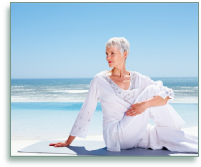
Menopause, Bio Identical Hormones, Sexual Health, Lack of Libido, Erection Problems, Gender Issues, Prostate Cancer, Psychiatry, Cancer




“ ..achievable lifestyle changes could make a marked improvement on the health of middle-aged and older people...”
Professor Kay-Tee Kwah, a gerontologist at Cambridge University (Journal of PLoS Medicine 2008)

Professor Kwah’s study revealed that a person’s life span can be increased by as much as 14 years by not smoking, by drinking only moderately, eating healthily and keeping physically fit. She noted that there were substantial differences in mortality associated with the four health behaviours combined.
The gene pool from which we are derived also influences our life expectancy - long lived parents are more likely to have long lived offspring. How long we live also relates to where and how we live, longer life relates to economic prosperity.
So, accepting that in some respects our demise is foretold in early life and that there are unalterable as well as unforeseen events that effect our health, let us consider what we can do to take control of the inevitable ageing process.
Exercise offers the single most important way to keep healthy. If we failed to keep fit when we were young we will still benefit, even if we start when we are already in our 70’s.
Walking, jogging, riding a bike or swimming - and activities such as dancing, gardening and golf - promote cardiac and pulmonary function. Even modest weightlifting will increase muscle which, with the liver, stores energy in the form of glycogen.
Muscle helps us maintain our independence. If we are unable to get out of an armchair because the quadriceps in our thighs are wasted, we are dependent on others to help us move. Warming up exercises keep us lithe and supple and, when we are older, are an essential preliminary to vigorous exercise.

A poor diet may account for as much as a third of mortality from cancer, stroke and heart disease. These conditions, so prevalent in the western world, derive in part from an imbalance in the foods we consume.
Diet or more correctly, nutrition, is the key to health. Essentially, our genes have remained unchanged in 15,000 years, arising from ancestors who were hunter-gatherers who grazed the plains of Africa.
What is there in making love that is good for our health? At a physical level it relaxes muscles tensed from work: physiologically, it boosts the hormones which keep us young; emotionally it provides the physical contact which we need to thrive.
The sex drive is so strong that from puberty onwards it finds outlet or is channelled into other physical or mental activities. In our striving 30s there may be a reduction in sex drive in the primary relationship. By late mid-life a couple’s sexual enthusiasm for their long standing partner often flags, and while ‘free floating’ libido may remain, loyalty to the partner dictates a faithful but largely companionate relationship. However, couples may continue sexual activity with satisfaction through four to five decades of their their life and it can remain an important aspect of the lives of older people as long as they wish it. Help for sexual failure in its various forms has undergone a revolution in the last 20 years and there is now a wide range of treatments available. The judicious use of hormone replacement therapy (HRT), despite controversy, offers both men and women a means of extending the years of fruitfulness with potential benefits outweighing risks to health.
‘Attitude’ plays a part in retaining emotional well-being, which in itself plays a great part in physical health. Feisty independence is a character trait identified amongst people who live longer. That, and active engagement within the community, enable a sense of purpose to be maintained. Retirement is a concept born more of economics than consideration for individual welfare.
Their diet of of grasses, roots, berries and fresh fruits remains a source of nutrition to which we are well adapted. It is likely that meat became important in our diet as a source of calorie dense food enabling survival in the last ice age. Salt was scarce so that we came to savour it. Sugar, mostly derived from fruit and honey, was less abundant than in our present diet. Our consumption of cereals did not significantly increase till our ancestors developed a settled way of life some 12,000 years ago.
Planning a healthy diet
One way suggested so as to obtain the correct quantities of the right food is to think of what you eat and drink in terms of servings.
Follow the guidelines below to plan your daily diet. A typical serving would be a piece of fruit, half a cup of vegetables, past or rice, a slice of bread, 55-85 grams (2-3 oz) of lean meat or 55 grams (2 oz) of cheese.

Exercise helps to:
Improve heart and lung function and immunity
Strengthen muscles, ligaments and tendons
Reduce anxiety, improve sleep and heighten well being
Burn excess calories
Help reduce blood pressure
Increase beneficial HDLs

Grain prodcuts
5 -12 servings
Choose whole grain and enriched products. They are filling and contain vitamins and minerals.
Fruit and vegetables
5-10 servings
These are rich in vitamins and minerals and also contain a high percentage of fibre and water to fill you up and prevent constipation. Eat - or drink in juice form - as much fruit and vegetables as you like, but no fewer than 5 servings.
Meat and alternatives
2-3 servings
Choose lean meats, poultry and fish as well as dried peas, beans and lentils. These are protein rich foods, which are vital for muscle and nerve function.
Dairy products
2-3 servings
Choose low fat milk products. They contain calcium which is needed for healthy bones, nerves and teeth.
Food to be eaten sparingly
These include foods that are mostly oils, such as butter, margarine, cooking oils and lard; foods that are mostly sugar, such as jam, honey, syrup and sweets; and high fat and/or high salty snacks such as crisps.

The family gives the best, although not the exclusive, example of a setting within which we, as parents, have physical contact, give and receive love and have sexual expression. Within it we have children and share with them the future through their growing up. In it three generations may find continuity and belonging. When we don’t belong to a family of this traditional sort we may seek a family amongst a network of friends, a peer group, or in a same sex relationship.
Healthy Ageing
What is healthy ageing?
Five steps to help take control of the ageing process
3. Eat well
4. Sex
2. Emotional
Well-being
1. Keep fit
5. In praise of families
Research affirms the need for intimacy! Infant observation studies have shown the crucial importance of a satisfying first relationship for the individual to develop a sense of separate identity, while ‘good enough’ parenting provides a template on which we can later model and achieve satisfaction from adult relationships.
Despite demographic change and a period of exceptional prosperity the qualities sought in our primary relationships have changed little. A recent survey about sexual behaviour asked respondents to rank ‘what makes a happy marriage’. Respondents listed in order faithfulness, mutual respect, sex, having children and shared interests. A generation earlier a similar survey on sex and marriage rated in rank order: comradeship, understanding, give and take, mutual trust, love and affection. With the exception of sex, about which so many now have high expectations, and the changing views of marriage as an institution, surveys show that the qualities we value in relationships have remained very similar.

 At Optimal Health we can assist you to achieve Healthy Ageing with improved wellbeing.
Our approach allows two one hour consultations to fully assess the present state
of your health, and to make recommendations for ongoing care and referral where indicated.
Our attention to you as an individual means the advice we give is tailored to your
circumstances. In our clinic you will receive regular follow up from people who care
about your wellbeing. Please contact Christine, the Clinic Manager, for further information,
and to make an appointment.
At Optimal Health we can assist you to achieve Healthy Ageing with improved wellbeing.
Our approach allows two one hour consultations to fully assess the present state
of your health, and to make recommendations for ongoing care and referral where indicated.
Our attention to you as an individual means the advice we give is tailored to your
circumstances. In our clinic you will receive regular follow up from people who care
about your wellbeing. Please contact Christine, the Clinic Manager, for further information,
and to make an appointment.
> Alzheimer’s.
Further information on healthy ageing
> The Process of Ageing.
> Memory.